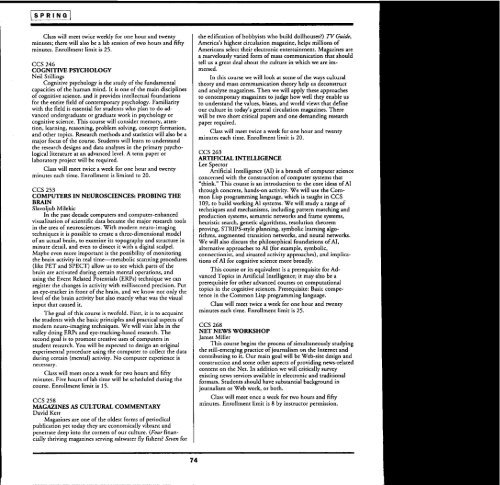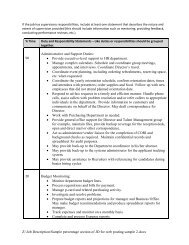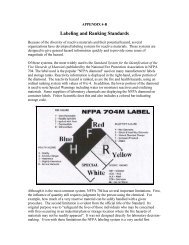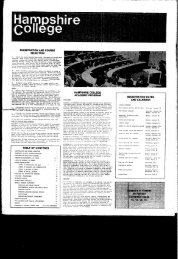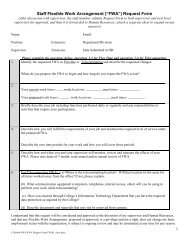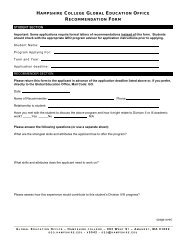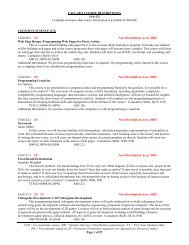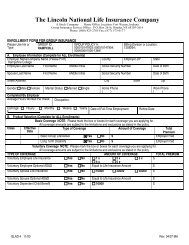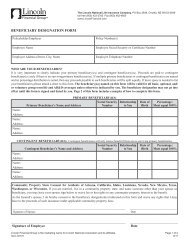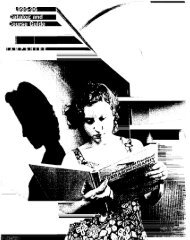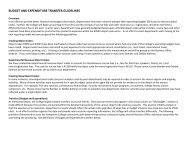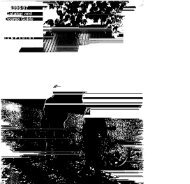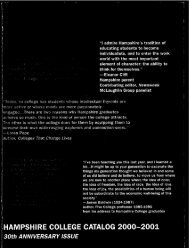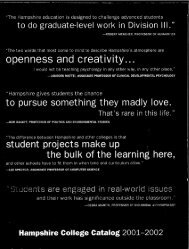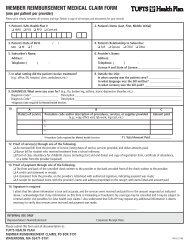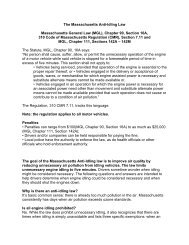school of social science - Hampshire College
school of social science - Hampshire College
school of social science - Hampshire College
Create successful ePaper yourself
Turn your PDF publications into a flip-book with our unique Google optimized e-Paper software.
iSPRINGi<br />
Class will meet twice weekly for one hour and twenty<br />
minutes; there will also be a lab session <strong>of</strong> two hours and fifty<br />
minutes. Enrollment limit is 25.<br />
CCS 246<br />
COGNITIVE PSYCHOLOGY<br />
Neil Stillings<br />
Cognitive psychology is the study <strong>of</strong> the fundamental<br />
capacities <strong>of</strong> the human mind. It is one <strong>of</strong> the main disciplines<br />
<strong>of</strong> cognitive <strong>science</strong>. and it provides intellectual foundations<br />
for the entire field <strong>of</strong> contemporary psychology. Familiarity<br />
with the field is essential for students who plan to do advanced<br />
undergraduate or graduate work in psychology or<br />
cognitive <strong>science</strong>. This course will consider memory, attention.<br />
learning. reasoning. problem solving. concept formation.<br />
and other topics. Research methods and statistics will also be a<br />
major focus <strong>of</strong> the course. Students will learn to understand<br />
the research designs and data analyses in the primary psychological<br />
literature at an advanced level. A term paper or<br />
laboratory project will be required.<br />
Class will meet twice a week for one hour and twenty<br />
minutes each time. Enrollment is limited to 20.<br />
CCS 253<br />
COMPUTERS IN NEUROSCIENCES, PROBING THE<br />
BRAIN<br />
Siavoljub Milekic<br />
In the past decade computers and computer-enhanced<br />
visualization <strong>of</strong> scientific data became the major research tools<br />
in the area <strong>of</strong> neuro<strong>science</strong>s. With modern neuro-imaging<br />
techniques it is possible to create a three-dimensional model<br />
<strong>of</strong> an actual brain, to examine its topography and structure in<br />
minute detail. and even to dissect it with a digital scalpel.<br />
Maybe even more important is the possibility <strong>of</strong> monitoring<br />
the brain activity in real time-metabolic scanning procedures<br />
(like PET and SPECT) allow us to see which parts <strong>of</strong> the<br />
brain are activated during certain mental operations, and<br />
using the Event Related Potentials (ERPs) technique we can<br />
register the changes in activity with millisecond precision. Put<br />
an eye-tracker in from <strong>of</strong> the brain, and we know nor only the<br />
level <strong>of</strong> the brain activity but also exactly what was the visual<br />
input that caused it.<br />
The goal <strong>of</strong> this course is tw<strong>of</strong>old. First. it is to acquaint<br />
the students with the basic principles and practical aspects <strong>of</strong><br />
modern neuro-imaging techniques. We will visit labs in the<br />
valley doing ERPs and eye-tracking-based research. The<br />
second goal is to promote creative uses <strong>of</strong> computers in<br />
student research. You will be expected to design an original<br />
experimental procedure using the computer to collect the data<br />
during cecrain (mental) activity. No computer experience is<br />
necessary.<br />
Class will meet once a week for two hours and fifty<br />
minutes. Five hours <strong>of</strong> lab time will be scheduled during the<br />
course. Enrollment limit is 15.<br />
CCS 258<br />
MAGAZINES AS CULTURAL COMMENTARY<br />
David Kerr<br />
Magazines are one <strong>of</strong> the oldest forms <strong>of</strong> periodical<br />
publication yet today they are economically vibrant and<br />
penetrate deep into the corners <strong>of</strong> our culture. (Four financially<br />
thriving magazines serving saltwater fly fishers? Seven for<br />
74<br />
the edification <strong>of</strong> hobbyists who build dollhouses?) TV Guide.<br />
America's highest circulation magazine. helps millions <strong>of</strong><br />
Americans select their electronic entertainment. Magazines are<br />
a marvelously varied form <strong>of</strong> mass communication that should<br />
tell us a great deal about the culture in which we are immersed.<br />
In this course we will look al SOllle <strong>of</strong> the ways cultural<br />
theory and mass communication theory help us deconstruct<br />
and analyze magazines. Then we will apply these approaches<br />
to contemporary magazines to judge how well they enable us<br />
to understand the values, biases, and world views that define<br />
our culture in today's general circulation magazines. There<br />
will be two short critical papers and one demanding research<br />
paper required.<br />
Class will meet twice a week for one hour and twenty<br />
minutes each time. Enrollment limit is 20.<br />
CCS 263<br />
ARTIFICIAL INTELliGENCE<br />
Lee Spector<br />
Artificial Intelligence (AI) is a branch <strong>of</strong> computer <strong>science</strong><br />
concerned with the construction <strong>of</strong> computer systems that<br />
"think." This course is an introduction to the core ideas <strong>of</strong> AI<br />
through concrete, hands-on activity. We will use the Common<br />
Lisp programming language. which is taught in CCS<br />
109. to build working Al systems. We will study a range <strong>of</strong><br />
techniques and mechanisms. including pattern matching and<br />
production systems. semantic networks and frame systems.<br />
heuriscic search, genetic algorithms, resolution theorem<br />
proving. STRIPS-style planning. symbolic learning algorithms.<br />
augmented transition networks, and neural networks.<br />
We will also discuss the philosophical foundations <strong>of</strong> AI.<br />
alternative approaches to AI (for example. symbolic.<br />
connectionisc, and sicuaced activity approaches). and implications<br />
<strong>of</strong> AI for cognitive <strong>science</strong> more broadly.<br />
This course or its equivalent is a prerequisite for Advanced<br />
Topics in Artificial Intelligence; it may also be a<br />
prerequisite for other advanced courses on computational<br />
topics in the cognitive <strong>science</strong>s. Prerequisite: Basic competence<br />
in the Common Lisp programming language.<br />
Class will meet twice a week for one hour and twenty<br />
minuees each rime. Enrollment limit is 25.<br />
CCS 268<br />
NET NEWS WORKSHOP<br />
James Miller<br />
This course begins the process <strong>of</strong> simultaneously studying<br />
che still-emerging practice <strong>of</strong> journalism on the Internet and<br />
contributing to it. Our main goal will be Web-site design and<br />
construction and some other aspects <strong>of</strong> providing news-related<br />
content on the Net. In addition we will critically survey<br />
existing news services available in dec[fonic and traditional<br />
formats. Students should have substantial background in<br />
journalism or Web work. or both.<br />
Class will meet once a week for two hours and fifty<br />
minutes. Enrollment limit is 8 by instructor permission.


